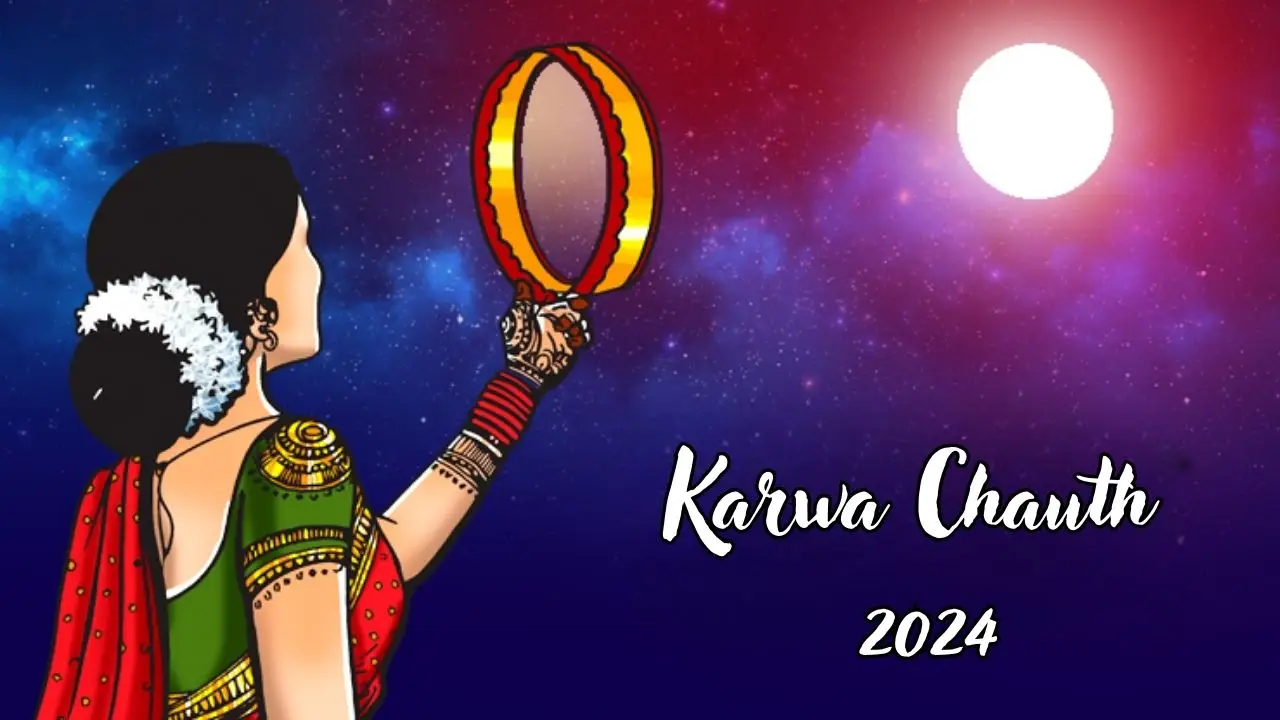Married Hindu women in India celebrate a major festival called Karwa Chauth. This day is very significant both culturally and emotionally because it represents a wife’s love and devotion to her husband.
The 20th of October will be Karwa Chauth 2024. Let’s examine the customs, ceremonies, and meaning of this lovely celebration.
Karwa Chauth 2024 Overview
| Event | Day/Date |
| Karwa Chauth | Sunday, October 20, 2024 |
| Karwa Chauth Puja Muhurat | 05:46 PM to 07:02 PM |
| Karwa Chauth Upavasa Time | 06:25 AM to 07:54 PM |
| Moonrise on Karwa Chauth Day | 07:54 PM |
| Chaturthi Tithi Begins | 06:46 AM on Oct 20, 2024 |
| Chaturthi Tithi Ends | 04:16 AM on Oct 21, 2024 |
Karwa Chauth 2024 Significance
Married women observe Karva Chauth, a special fasting ritual, in hopes of extending their husbands’ lives, blessings, and prosperity.
Throughout the day, women refrain from consuming food and drink, dedicating this time to strengthening the marital relationship, from dawn until the moon rises at night. This rigorous fast, referred to as nirjala vrat, showcases the affection and commitment of wives to their husbands.
Additionally, Sankashti Chaturthi, a day of fasting honoring Lord Ganesha, falls on the same day. Married women therefore worship Lord Shiva, Goddess Parvati, Lord Ganesha, and Lord Kartikeya during Karva Chauth Puja to ask for blessings for their husbands’ long life and happiness.
Rituals of Karva Chauth
Karva Chauth, or Karak Chaturthi, is a deeply religious and culturally significant holiday. The clay pot known as “Karva” or “Karak” is an essential part of the evening Puja ritual. Women offer water offerings to the moon with the pot, referred to as Argha.
The Karva is then donated to a Brahmin or a suitable woman as Dan (charity). The women have a pre-dawn meal known as sargi to start the day early. The mother-in-law usually makes and presents sargi, which consists of fruits, sweets, and savory foods that provide the body the fuel it needs to endure the daylong fast. After this meal, the fast is dutifully maintained without even sipping water until the moon appears.
Women wear traditional clothing in the evening, usually in bright colors or red to represent the joys of marriage. They get together for the evening Puja with other married women after adorning themselves with jewelry and mehendi. Sitting in a circle, they sing folk songs honoring Karva Chauth and trade stories.
Women do not drink water until the moon is visible
Early in the morning is when the day starts. Women eat Sargi cuisine. The mother-in-law makes this sargi, which is served with fruits, desserts, and breakfast foods. which supplies the energy needed to maintain a fast all day. Following this, women begin their fast at sunrise and don’t even sip water until the moon rises.
Breaking the Fast
Only after seeing the moon is the fast broken. After looking through a sieve at the moon, women use the same sieve to look through their husbands’ faces.
Through this ritual, they express that their spouse is their entire universe and they offer prayers for his long life and health. The husband gives his wife the first sip of water and a morsel of food after making the water offering (Argha) to the moon, signifying their shared devotion and love.
Sankash Chaturthi
Additionally, Sankashta Chaturthi, a day of fasting honoring Lord Ganesha, falls on the same day. On this day, women worship Lord Shiva, Goddess Parvati, Lord Ganesha, and Lord Kartikeya to bless their husbands with long lives and happiness.
Karva Chauth is not just a Fasting Ritual
Karwa Chauth is more than just a fasting day; it also celebrates devotion, affection, and the sacred bond of matrimony. This festival has long been cherished by married women due to its rich traditions and vibrant cultural heritage.

